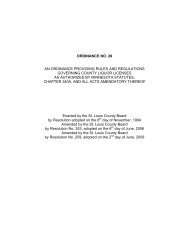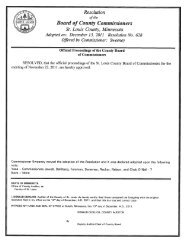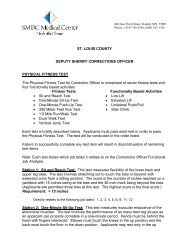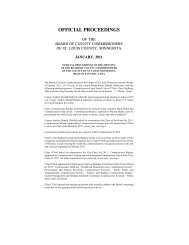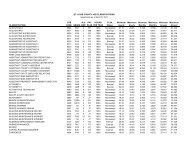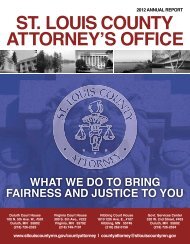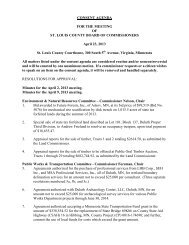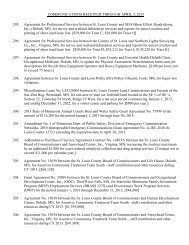Assessment Practices Review Panel - St. Louis County
Assessment Practices Review Panel - St. Louis County
Assessment Practices Review Panel - St. Louis County
Create successful ePaper yourself
Turn your PDF publications into a flip-book with our unique Google optimized e-Paper software.
Public perception of changing to a True <strong>County</strong> system<br />
A change of the system may lead to a negative perception among taxpayers regarding due<br />
process. Part of the public may be concerned that their properties are no longer locally<br />
assessed. An additional concern may be a lack of trust that a more centralized assessment<br />
process (bigger government) is not necessarily better. *Note: One could argue that if<br />
uniformity is the goal a centralized process is more likely to produce this as an outcome.<br />
Political implications relationship with local jurisdictions<br />
A change to a True <strong>County</strong> system requires local jurisdictions to give up a historically<br />
local responsibility/right by statute.<br />
Implications of a larger centralized organization<br />
There is currently no good mechanism to manage/secure access to historical assessor data<br />
such as field notes. These may get lost in a transition from a mixed assessed to a True<br />
<strong>County</strong> system. This is, however, also a concern within the current system any time there<br />
is a change in local assessor responsibilities. As the county moves toward electronic<br />
record keeping this will become less of an issue moving into the future.<br />
A larger organization may lead to more specialization. As a result the assessment process<br />
in a jurisdiction may be divided between a number of persons, for example, commercial<br />
and residential property assessors.<br />
A True <strong>County</strong> system will shift cost distribution<br />
A change in how the assessment process is paid for will result in winners and losers.<br />
Unorganized township property owners will pay more, and property owners in organized<br />
jurisdictions pay less. Further, the funding of the assessment process will shift from partly<br />
fee-based funding at the local level to complete funding through the county’s general<br />
levy.<br />
City of Duluth True <strong>County</strong> cost implications<br />
The City of Duluth, if it chooses to carry out its own assessment, will see an increase in<br />
cost. They will employ their own assessor’s office plus fund a part of the county<br />
assessor’s office as part of the county’s general levy. Under a True <strong>County</strong> system the<br />
assessor’s portion of the general levy will increase for all taxpayers in the county<br />
including those in the City of Duluth. Maintaining its own office will not allow the<br />
elimination of local assessment cost for the city as will be the case for all other<br />
jurisdictions.<br />
<strong>St</strong>. <strong>Louis</strong> <strong>County</strong> <strong>Assessment</strong> <strong>Practices</strong> <strong>Review</strong> <strong>Panel</strong> Draft Report February 2012 Page 32



